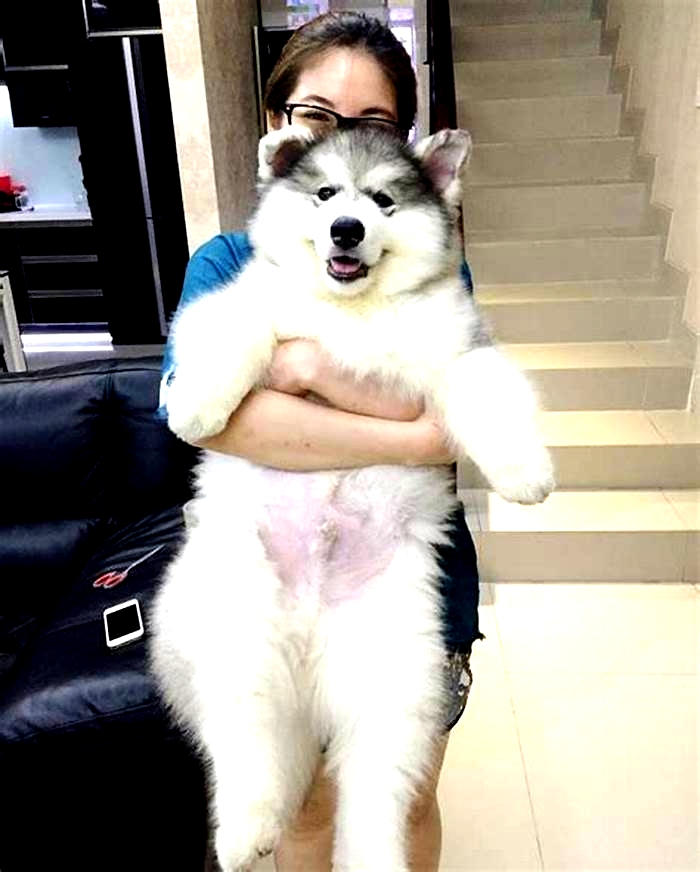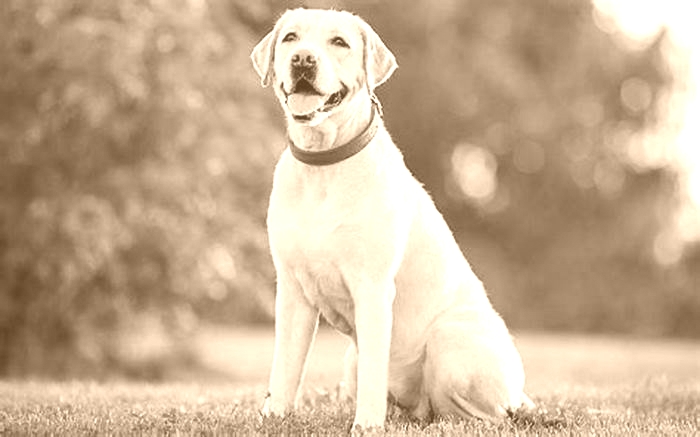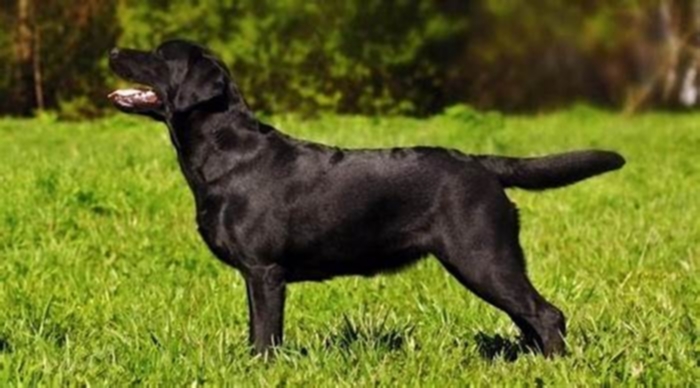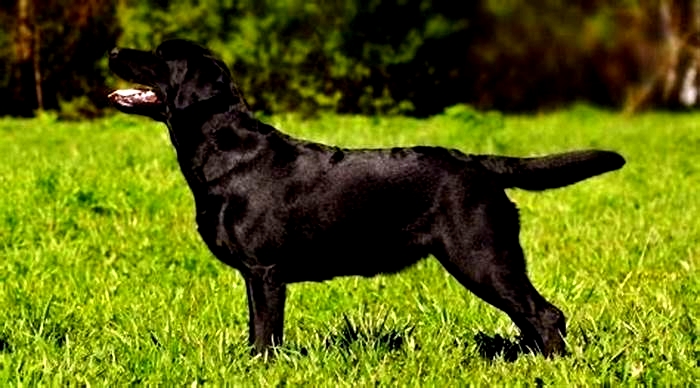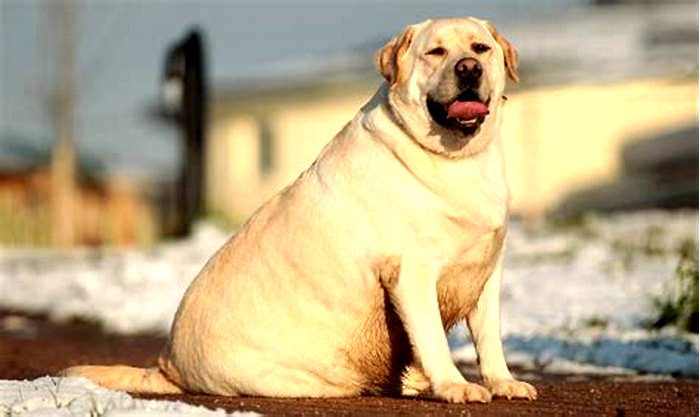Why are Labradors chubby
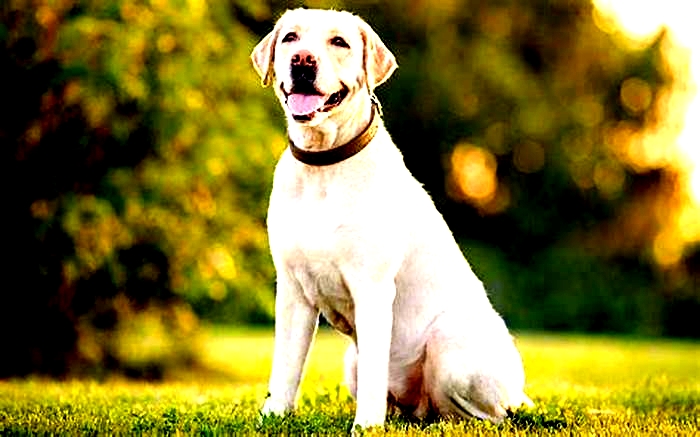
Do You Have a Fat Black Lab? This Is Why
Have you ever wondered why your Labrador seems a little bit on the uhhm. heavier side than your neighbors dogs? No, it has nothing to do with his cushy looking coat or the fact that you are just a wonderful owner. There is a scientific reason why Labradors, in particular, are predisposed to being fat. Here is the real reason why your Labrador is fat and what you can do about it.
Why Do You Have a Fat Black Lab?
Whenever you visit a dog park near you, there is a good chance that you will find more than one Labrador receiver. This dog breed is a favorite with many dog lovers for a few excellent reasons:
- They are family-friendly
- They grow to just the right size (not too big nor too small)
- They are impossibly adorable
While its true that Labs are favorites for many households, this breed has a specific problem that seems to plague a majority of them. They are fat. There is a good chance that you have seen a fat black Lab somewhere or that you have one.
Its true that Labradors tend to love their food. In many cases, the wolf down whats on their plate quickly prompting you (the wonderful owner that you are) to think that they might still be hungry, so you add them more food. Its easy to see why.
A fully grown Lab could weigh up 70 pounds. That size alone lets you assume that your dog needs more food. And then there are those adorable eyes and face when he looks up to you for treats. How can you say no to them?
It turns out; it might not be all your fault (thank goodness). Scientists have found that Labs, in particular, have a very specific genetic variation that predisposes them to gain weight quickly.
The Science Behind Why Your Labrador Is Fat
A team of scientists from Cambridge took the time to study and compare the DNA between 15 obese Labs to 18 lean ones. What they were looking for was a specific gene variation called POMC that caused weight gain in mice. They found that this gene seemed to be more commonly mutated in the fat Labs than it was in the lean one.
What this gene mutation does is that it disrupts the ability of the dog to sense that it had a lot of stored fat. The gene also rewired the dogs brain reward system and made it easy for it to overeat without realizing that it was doing so.
The team realized the reason why Labs have this gene mutation. Because Labradors are originally working dogs, they always needed to eat more to perform their duties well (dog owners tended to prefer food-motivated dogs because they were easier to train). Because of this, owners went on to breed more Labs, and the gene mutation continued to proliferate the species.
Todays Labs are not working dogs, and thanks to this gene mutation; you have a fat black Lab.
What Can You Do About Your Fat Black Lab?
The very first thing you need to do is check if your Labrador is fat. The healthy weight for a fully grown Labrador falls between 55 and 80 pounds. Generally, if the Lab falls around 70 pounds, he/she is not fat just yet. Here is a simple guideline that should help:
- A male Lab will weigh about 10 pounds more than his female counterparts
- If your Lab is close to or past the 100-pound mark, then they are obese, and you need to do something about it
Here are some tips on how to keep your Labs weight in check:
1. Consider Changing What You Feed Your Lab
One way to try and manage your dogs weight is to change what you are feeding him. High fiber foods tend to be good for dogs with weight issues. Not only are these foods more filling, but they also provide your dog with all the nutrients that they need to remain healthy.
High fiber diets tend to stimulate your dogs metabolism too. The only issue here is that many of these high fiber foods are not as flavorful as you Lab may be used to and as such, he might reject it at first.
2. Give Him Smaller Portions
Because your dog may not readily accept the change of diet, you might be tempted to go back to feeding him whatever it was that he liked so much before. No one can blame you. No one wants to see their dog suffer.
However, if you are going to keep feeding your Lab the same food, then you might want to consider reducing his portions by like 20 percent. Dont give in when he looks up to you with those cute eyes and give him more treats.
3. Stop Giving Him Treats
Now, completely eliminating treats from your dogs life might sound cruel on so many levels. One, they absolutely love them and are used to them by now and two, its how you get them to do what you want.
However, the truth is that these treats are problematic because they increase the dogs caloric intake. If you are not so inclined to completely stop giving your dog treats, then how about switching to low calorie treats for dieting dogs?
These are still just as delicious, you will still be friends with your dog, he will still do what you want him to, and best of all, he wont gain as much weight from eating them. In addition to this, you should consider giving him fewer treats every day.
Finally, and this might sound obvious, but its often ignored by many homeowners: increase the amount of exercise and activity that your dog gets. This means that you will have to walk him more, play with him more, and generally keep him up and active a lot more.
If you simply dont have the time for that or are not home a lot, you can hire a dog walker or trainer who will ensure that your fat black Labs activity levels are increased for his own good. The Lab will love it because genetically, they are working dogs.
Why Labradors are chubby and are their genes to blame
Scientists have determined that due to a genetic mutation, some Labradors and flat-haired retrievers burn fewer calories, which is why they are constantly hungry.
That is why the owners of these dogs must take care and ensure that their pets do not become obese.
During the research, the mutation was found in one in four Labradors and two thirds of smooth-haired retrievers.
"This knowledge confirms the power of our genes and how they change how we feel about food," says Eleanor Rafan, a scientist from the University of Cambridge.
Dogs, like humans, have genes that affect appetite and metabolic rate.
"If we're dealt a genetic hand of cards that makes us feel like we're always hungry or always wanting to eat, it takes more effort to stay slim," Rafan told BBC News.
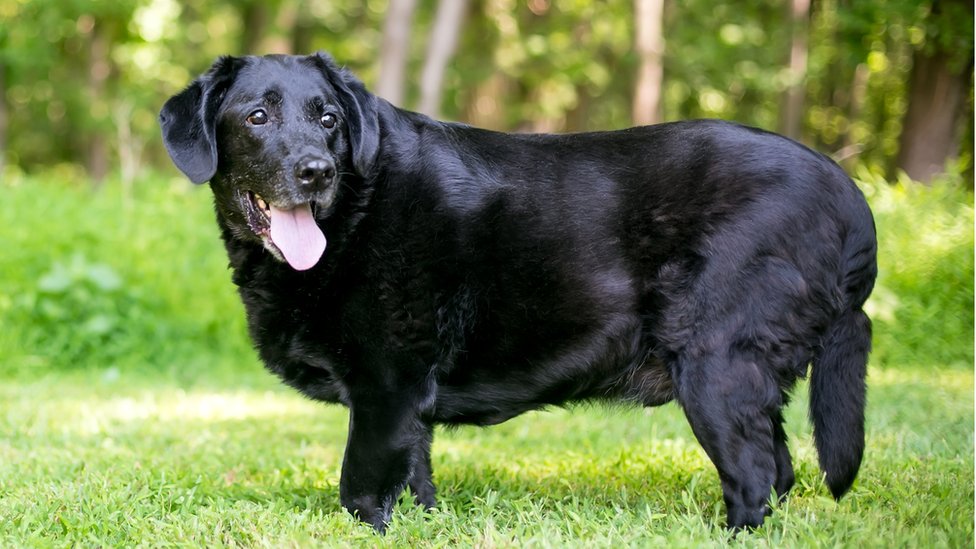
The study builds on previous research into the gene mutation, better known as POMC.
The POMC gene and brain circuitry that influences food behavior is similar in dogs and humans.
Not only are dogs with the mutation hungrier between meals, but they also expend about 25 percent less energy while resting, meaning they don't need to consume as many calories.
"Because of this genetic mutation, they struggle with a double problem, not only do they want to eat more, but they also need fewer calories because they don't burn them as quickly," says Rafan.
80 Labradors participated in the research.
They were subjected to various tests, one of which was the "sausage in a box".
The dog was exposed to temptation because they could see and smell the treat.
Those with the POMC mutation tried harder to reach the sausage than those without it.
Also, they were hungrier.
They slept in a special chamber where the amount of gases they exhaled was measured.
Those measurements confirmed that those with the POMC mutation burn about 25 percent fewer calories than dogs without it.
Katherine Taylor has a big chunky labrador, Leo, who took part in the study.
Taylor says Leo can eat anything from a salad he finds on the table to beans and carrots he digs up in the garden.
"Even though we feed him regularly, he'll want more after a meal," she says.
She tries to keep Leo slim and uses a slow feeding bowl.
As many as two out of three dogs (34-50 percent) in rich countries are now overweight.
Research has shown that Labradors, which are relatively easy to train for life in the house, are the most obese and the most obsessed with food.
Maybe owners unknowingly choose Labradors with the mutation because they love food and will do anything for a biscuit, scientists wonder.
The research, published in the journal Science Advances, was funded by the animal welfare associations Velkom Trust and Dogs Trust.
Watch the video
Follow us on Facebook,Twitter i Viber. If you have a topic proposal for us, contact us at [email protected]
Fat labradors may carry 'obesity gene'
Barcroft/Getty Images
Chubby labrador retrievers may be genetically predisposed to obesity, according to a new University of Cambridge study.
The dog which is the most popular breed in the UK is often considered to be "obsessed with food", say the researchers, which could be explained by the gene. Their research has been published in the journal Cell Metabolism.
310 pet and assistance labradors were weighed, assessed, and given a "body condition score". The team also "searched for variants of obesity-related genes" and assessed food-motivation via a diary kept by dog owners. And the research found that one particular gene POMC was associated with obesity in the labradors, with around one in four labradors thought to carry the gene. It affects how the brain regulates and recognises the feeling of hunger meaning the dogs may carry on eating when they're full.
variant in Labradors and has a significant effect on those dogs that carry it, so it is likely that this helps explain why Labradors are more prone to being overweight in comparison to other breeds," said Eleanor Raffman, lead author of the research. "People who live with Labradors often say they are obsessed by food, and that would fit with what we know about this genetic change."
The team says the research may also have an impact on our understanding of human obesity. "Common genetic variants affecting the POMC gene are associated with human body weight and there are even some rare obese people who lack a very similar part of the POMC gene to the one that is missing in the dogs. So further research in these obese Labradors may not only help the wellbeing of companion animals but also have important lessons for human health," said Stephen O'Rahilly, who also worked on the research.
Obesity in dogs can cause diabetes, heart disease, cancer and a reduced lifespan.
<blockquote class="clearfix cam-float-right">
</blockquote>
This article was originally published by WIRED UK
Why Labradors are chubby and are their genes to blame
Scientists have determined that due to a genetic mutation, some Labradors and flat-haired retrievers burn fewer calories, which is why they are constantly hungry.
That is why the owners of these dogs must take care and ensure that their pets do not become obese.
During the research, the mutation was found in one in four Labradors and two thirds of smooth-haired retrievers.
"This knowledge confirms the power of our genes and how they change how we feel about food," says Eleanor Rafan, a scientist from the University of Cambridge.
Dogs, like humans, have genes that affect appetite and metabolic rate.
"If we're dealt a genetic hand of cards that makes us feel like we're always hungry or always wanting to eat, it takes more effort to stay slim," Rafan told BBC News.

The study builds on previous research into the gene mutation, better known as POMC.
The POMC gene and brain circuitry that influences food behavior is similar in dogs and humans.
Not only are dogs with the mutation hungrier between meals, but they also expend about 25 percent less energy while resting, meaning they don't need to consume as many calories.
"Because of this genetic mutation, they struggle with a double problem, not only do they want to eat more, but they also need fewer calories because they don't burn them as quickly," says Rafan.
80 Labradors participated in the research.
They were subjected to various tests, one of which was the "sausage in a box".
The dog was exposed to temptation because they could see and smell the treat.
Those with the POMC mutation tried harder to reach the sausage than those without it.
Also, they were hungrier.
They slept in a special chamber where the amount of gases they exhaled was measured.
Those measurements confirmed that those with the POMC mutation burn about 25 percent fewer calories than dogs without it.
Katherine Taylor has a big chunky labrador, Leo, who took part in the study.
Taylor says Leo can eat anything from a salad he finds on the table to beans and carrots he digs up in the garden.
"Even though we feed him regularly, he'll want more after a meal," she says.
She tries to keep Leo slim and uses a slow feeding bowl.
As many as two out of three dogs (34-50 percent) in rich countries are now overweight.
Research has shown that Labradors, which are relatively easy to train for life in the house, are the most obese and the most obsessed with food.
Maybe owners unknowingly choose Labradors with the mutation because they love food and will do anything for a biscuit, scientists wonder.
The research, published in the journal Science Advances, was funded by the animal welfare associations Velkom Trust and Dogs Trust.
Watch the video
Follow us on Facebook,Twitter i Viber. If you have a topic proposal for us, contact us at [email protected]



